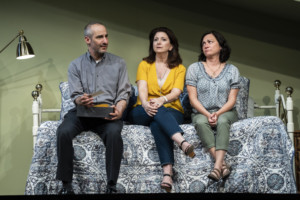Review: IF I FORGET at Victory Gardens Theater

In IF I FORGET, Steven Levenson provides a close study of the kitchen sink family drama. At its center, the play addresses fundamental questions about what it means to be Jewish in America at the turn of the 21st century (the first act of the play takes place in July of 2000, while the second jumps to the post 9-11 moment of February 2001). IF I FORGET centers on the Fischer family as a means to pose those questions in a specific context through the family's three generations. In each individual scene, Levenson displays a knack for realistic and specific dialogue. Devon de Mayo's direction and the tight-knit ensemble also portray family tensions that feel altogether too real.
The challenge is that the themes above only scrape the surface of what Levenson puts on the table in IF I FORGET. Levenson's questions surrounding contemporary American Judaism, Holocaust remembrance, and what we owe to the generations that come before and after us are grounded and intriguing. But he expands the play out to cover a broad swath of other issues, including mental illness, the pitfalls of the early days of the World Wide Web, and gentrification in urban American cities. In bringing together all these issues, Levenson has bitten off a bit more than he can chew. As a result, IF I FORGET suffers from some structural challenges. The second act in particular contains a series of lengthy scenes that all end with shouting matches and abrupt black-outs. Because the play brings so many ideas into the fold, the dramatic concluding moment also feels tacked on and not altogether satisfying.
When IF I FORGET focuses keenly on the questions that most acutely affect the Fischer family, that's where the play finds success. It helps too that de Mayo has brought together an ensemble that gamely tackles each and every plot point. Patriarch Lou Fischer (David Darlow, who deftly handles an astounding transformation in his character) is mourning the loss of his wife and the cultural shifts in the Washington D.C. area in which he has long lived. Oldest sister Holly Fischer (Gail Shapiro, with great energy) is trying to keep her household in order, guide her teenage son Joey (Alec Boyd, with excellent comedic timing), and get her fledging interior design business off the ground. Middle sibling Michael (Daniel Cantor) is awaiting both news about his tenure track at New York University and the upcoming publication of his book on modern Judaism-which has some rather controversial content. Youngest sibling Sharon Fischer (Elizabeth Ledo, in a moving and thoughtful turn) finally seems on her way to finding some contentment in life-if her siblings' drama doesn't get in the way. Rounding out the clan are Michael's wife, Ellen (Heather Townsend) and Holly's husband, Howard (Keith Kupferer, with reliably amiable delivery), who try to strike the balance between contributing when they can-and staying out of the way when they know they should.
This ensemble displays the dynamics of the Fischer family with every bit of color and chaos. Andrew Boyce's bi-level set allows the action to unfold in a space that seems maximized for eavesdropping on family secrets-or enabling any number of family shouting matches to unfold in the living room. All the actors bring their characters to life with nuance and specificity, reflecting how family members can be both alike and also quite dissimilar. Cantor, Ledo, and Shapiro have a convincingly sticky sibling rapport, but they also demonstrate that the Fischer siblings know when they need to be united. And while IF I FORGET is a serious play, the actors also nail every moment of comedy that Levenson has baked into the script.
When IF I FORGET focuses keenly on the Fischers and their specific struggles with modern-day Judaism and generational tensions, the play feels most successful. IF I FORGET covers so many additional issues, though, that it is hard to remember them all. Still, Levenson clearly understands how to write family drama and that never fails in this piece.
IF I FORGET plays at Victory Gardens Theater, 2433 North Lincoln Avenue, through July 7. Tickets are $27-$60. VictoryGardens.org
Photo Credit: Liz Lauren
Reader Reviews

Videos

